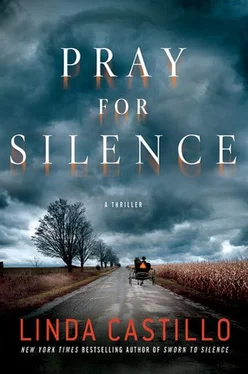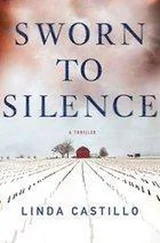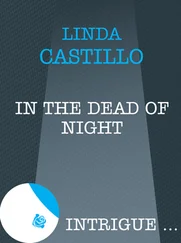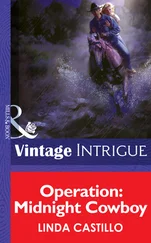“Of course,” Alma says. “Come in.”
Glock and I enter a small living room. The plywood floor is covered with a blue and white braided rug that’s tracked with dirt. Against the far wall, a walnut bench is draped with a worn quilt and a couple of throw pillows. I smell kerosene and frying scrapple and for an instant I’m reminded of my own childhood home. A bittersweet memory best left in the past.
“There was a problem at the Plank farm,” I begin. “A shooting.”
She presses her hand against her breast. “Was anyone hurt?”
“I’m afraid so.” I don’t elaborate. I want her husband there when I tell them about the murders. I don’t believe the Zooks are involved. Still, I want to see their unrehearsed reactions when I tell them the news.
“Has something happened?”
I turn at the male voice and see William Zook approach from the kitchen. He’s a tall, thin man with hunched shoulders and a salt-and-pepper beard badly in need of a trim. He wears a blue work shirt rolled up at the sleeves, a flat brimmed straw hat, trousers and suspenders. His eyes are sharp and suspicious when they land on me.
Showing him my badge, I get right to the point. “Mr. Zook, there was a shooting last night at the Plank farm. I’d like to ask you and your wife a few questions.”
“A shooting accident?” His eyes narrow. “Was anyone hurt?”
Normally, I don’t release the names of the deceased until I’ve notified the next of kin. Since the Planks are from Lancaster County, I’m still working on obtaining NOK contact information, which could take a few hours. With the clock ticking and a killer on the loose, I can’t put my investigation on hold that long. If a member of the Zook family saw something, I need to know about it now.
“The entire family was murdered,” I say.
“Ach!” William presses his hand to his chest.
Across the room, his wife gasps. “The children?”
I glance over at her and shake my head. “There were no survivors.”
Quickly, I shift my attention back to William. His complexion has gone pale. He stares at me as if I’ve just plunged a knife into his chest. “Dead?” he whispers. “All of them?”
“I’m afraid so.”
“Oh, dear Lord.” Alma covers her mouth with both hands and looks at me over the tops of her fingers. “Who would do such an evil thing?”
“Did you see or hear anything strange last night?” I ask.
Both heads shake, but it is William who speaks. “The Plank house is over a mile away. Sometimes we do not see them for days at a time.”
“When did you last see them?” Glock asks.
William shifts his attention to Glock, his brows knitting. “I saw Amos yesterday morning. I was repairing the fence, near the road. He was in the buggy and stopped to say hello.”
“How did he seem?” I ask.
“Fine. We talked about the corn harvest. He wanted me to butcher a hog for him. I told him I would pick out a fat one for them.”
“How did he seem to you? Normal? Nervous or upset?”
He shrugs. “He seemed the same as always.”
Alma wrings her hands. “Who did this terrible thing?”
“We don’t know.” I turn my attention to her. “Were either of you close to the Planks?”
William answers. “We see them at worship.”
“I quilted with Bonnie, Mary and Annie just last week,” Alma puts in.
As a teenager, I spent many an evening cutting, pinning and sewing fabric. Quilting is the perfect activity for female bonding—and an even better forum for gossip. “Did Bonnie or either of the girls mention any problems? Family problems? Money problems?”
“They mentioned no such thing,” Alma responds.
I look at William. He’s standing so close I can see the crumbs from his breakfast toast in his beard. He smells of pig shit and hot lard. “Do you know if they had any enemies?” I ask. “Anyone who might have been unhappy or angry with them?”
“They were good neighbors.” William shakes his head as if still reeling from news of their deaths. “A happy, generous family. I do not understand how this could happen.”
“Has anyone made any threats against them?” Glock asks.
Alma looks upset. I can’t tell if it’s from the news of her neighbors’ deaths or something else. “Everyone loved the Planks. They were very kind.”
“What about the kids?” I press. “Did any of them ever get into trouble?”
Alma shakes her head. “The children were well behaved. Even Mary, who was going through her rumspringa. ”
Rumspringa is the “running around” period Amish teens go through when they turn sixteen or so. It’s their time to experience the world without the social constraints of the Plain life. Usually, that entails some drinking and generally harmless misbehaving; nothing excessive. It’s the period in which teens decide whether or not they want to be baptized. Most ultimately choose to join the church. I’m one of a small percentage who did not. But I had my reasons.
Footsteps on the stairs snag my attention. I look over to see two young boys wrestle down the steps. They notice Glock and me, and freeze, giving us dual deer-in-headlights looks.
“No roughhousing inside,” William scolds.
His wife gives me a weak smile. “Our boys, Billy and Isaac.”
“Do you mind if I ask them a couple of questions?” I know sometimes kids see things, know things parents do not.
For an instant, Alma looks alarmed, and I realize my being formerly Amish only goes so far when it comes to bridging gaps.
William calls the boys over and addresses them. “Billy. Isaac. Chief Burkholder would like to ask you a few questions.”
I almost smile when both boys’ eyes widen. “Just a couple of easy ones,” I say in an attempt to put them at ease.
Both boys have thick blond hair blunt cut above their brows. Isaac is younger and looks at me as if I’m about to drag him off to prison for the rest of his life. Billy appears to be about fourteen or fifteen. But there’s a childlike innocence in his expression that belies his age.
I offer my friendliest smile. “How old are you guys?”
“I’m eleven,” Isaac says, his chest puffing out a little.
“That’s pretty old.” I smile, but my attempt at juvenile humor falls flat. I turn my attention to Billy. “How about you?”
“He’s fifteen.” Isaac answers for his brother.
“Did either of you happen to see anything strange over at the Plank farm the last few days?”
“What do you mean by strange?” Isaac asks.
I shrug, noticing the younger boy is much more articulate than his older brother. “Any English cars? Or maybe a buggy you didn’t recognize? Strangers visiting? Anything like that?”
“No.”
“Did you hear anything?” Glock asks. “Unusual sounds? Shouting? Crying?”
“No.” Isaac looks toward his parents for direction. “Did something happen to the Planks?”
“I saw Mary’s underwear!” Billy blurts the words, then slaps his hand over his mouth, his cheeks reddening.
The odd comment garners everyone’s attention. Only then do I realize that while Billy is older than Isaac, his mentality is that of a much younger boy. I discern a slight speech impediment. He rounds his Rs and skipped pronunciation of the D altogether. The incidence of mental retardation is slightly higher among the Amish in comparison to the general population. There are several theories on the cause, the most prevalent being the small size of the gene pool. The majority of Amish do not marry outsiders; very few non-Amish join the Plain life. The gene pool has been closed for about twelve generations.
“When did you see her, Billy?” I ask.
“I dunno.” When he looks up at me, I notice he suffers with strabismus, or crossed eyes. “One day. It was sunny. She was pretty.”
Читать дальше












